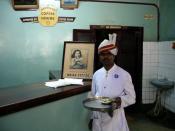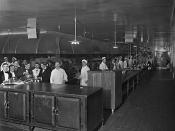Authors use many tactics to reveal a character's personality. In the short story, A Clean, Well-Lighted Place, Hemingway exposes the attributes of his characters through narration and dialogue. The older waiter's characteristics are exhibited through the waiters' conversations and the observations the narrator makes. The author cleverly associates the older waiter with the old man. This connection gives the audience a clear understanding of the loneliness and old age the waiter faces.
The older waiter in Hemingway's story identifies with the old man. This is evident through the statements he makes to the younger waiter. In the begining of the work the younger waiter is complaining about the old man staying at the cafe. The older waiter takes up for the old man by explaining that the old man, "stays up because he likes it" (Hemingway 160). This is the initial time that the older waiter indicates that he identifies with the old man's feelings.
This identification becomes more apparent farther in the work. For instance, the older waiter categorizes himself as being one, "of those who likes to stay late at the cafe"(Hemingway 161). With this declaration, the older waiter places himself in the same group as the old man. Hemingway's comparison of the old man and the waiter becomes unmistakable through the words of the older waiter.
Loneliness and old age are the common bonds that the older waiter shares with the old man. This is manifested through the dialogue between the two waiters. For example, when the younger waiter boasts about his youth and confidence, the older waiter jealously replies, "I have never had confidence and I am not young"(Hemingway 161). The older waiter goes on further to illustrate that all he has is work. The older waiter later displays his...


